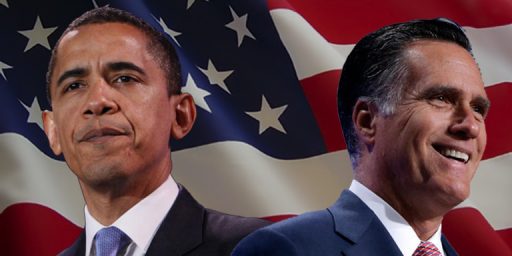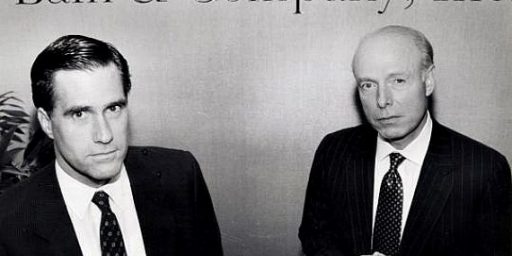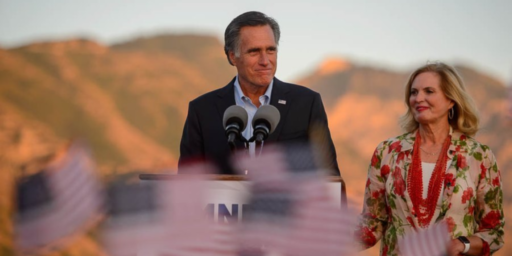Presidents Do Foreign Policy, Too?
In a posting for New Atlanticist titled "Status Quo Election," I note the near total absence of foreign affairs from a presidential campaign that's mercifully coming to an end.
In a posting for New Atlanticist titled “Status Quo Election,” I note the near total absence of foreign affairs from a presidential campaign that’s mercifully coming to an end.
Today, Americans elect the man who will be president for the next four years. From a foreign policy standpoint, at least, we’re likely in for the status quo–and not just because President Obama is likely to be re-elected.
Buried in the election eve Gallup poll, which headlines Romney’s microscopic 49 percent to 48 percent lead over Obama among likely voters in a meaningless national survey (America doesn’t elect presidents in a national popular vote; ask Al Gore) is an interesting nugget: while 51 percent of Americans disapprove of Obama’s handing of foreign policy, 52 percent think he would better handle it going forward than Mitt Romney, who gets only 44 percent.
This is the first presidential election in my lifetime, then, where the Democrat had the advantage on national security issues over the Republican. The last time that happened, Lyndon Johnson was running against Barry Goldwater.
Despite that position of strength—and a corresponding weakness on economic issues—Obama and his team have avoided mentioning foreign policy entirely, aside of course from constant reminders that Osama bin Laden was killed on Obama’s watch. For that matter, so has the Romney campaign, except for half-hearted hand waving over Obama’s lack of toughness, a longstanding Republican trope that simply doesn’t hold water this time around.
[…]
This is rather ironic in that, while presidents have relatively little impact on creating private sector jobs—the thing that Obama and Romney have both spent the most time pledging to do—they have enormous latitude on international affairs. Presidents can and do take the country to war, make decisive diplomatic overtures at key moments, and otherwise tremendously influence America’s position in the world. But they get elected on the basis of who would make the better Mayor of America.
Certainly, it’s not as if there are no major foreign policy issues to discuss. The United States military is in the twelfth year of a war in Afghanistan and seemingly further from accomplishing the mission with each passing day. Iran is inching closer to building nuclear weapons, an outcome that both candidates deem “unacceptable.” The Syrian regime is killing hundreds of its own citizens a day in order to stay in power. American drones are killing “militants” and innocents alike in more countries than you can shake a stick at. Oh, and Europe’s economy may be on the verge of collapse.
More at the link.






If you haven’t you should read Steve Clemon’s take on the Foreign Policy Vote.
http://www.thewashingtonnote.com/archives/2012/11/the_strategic_c_1/
Key take-away:
Hey, let’s discuss the Obama-Panetta doctrine:
Obama’s paralysis by fear is spreading causing good men to bleed out as the wonks in the rear run risk algorithms.
Given:
a) Romney’s not only lack of expertise, but apparent lack of interest.
b) No apparent real policy difference except for Romney wanting to bomb Iran, which almost no one else in the country wants to do.
There isn’t much Romney as the challenger can say except, ‘I’ll do the same stuff but be more macho.”, which in Romney’s case is laughable. If unchallenged, Obama needn’t bring it up, except of course the frequent, and quite appropriate, references to the exit from Iraq and to the late Mr. bin Laden.
Before giving it up as a bad job Romney would occasionally say we shouldn’t set a date in Afghanistan, or we should do more in Syria. But apparently he had no real answer to the obvious, ‘So what would you do different, pretty boy?’
@JKB: What “horrible abandonment?”
If you want to look at “horrible abandonment”, look at what the US did for all the Iraqi and Afghan translators who have worked with us.
World Net Daily?! Seriously?!
Has JKB really given up on any hold on reality? Or has the real possibility of an Obama win turned him into an extra bitter (note his recent attempts at “ironic” humor) wingnut?
If Obama does in fact win, I’m taking bets on how soon until JKB goes out in a flame of “humorous” racist-conspiracy filled posts and personal attacks?
As a military member, I’ve sometimes described myself as almost a “one issue voter”. For this election, if you asked me what my most important criteria was for choosing between the two men that had a chance of winning (sorry Gary Johnson), it was definitely …
“Which man is least likely to get us into an actual shooting war with Iran?”
… and that’s who I voted for.
Well, let’s not confuse presidential campaigns with actual presidencies.
The reason why foreign policy wasn’t a key subject of this campaign — so obvious, incidentally, it could only be missed in the Internet-academe-media cocoon — is because the election was about the economy.
If Romney wins it most certainly will not be a “status quo” administration. Right off the bat he’ll repair ties with Israel. Within a few weeks he’ll begin a push for fast tracking of free trade pacts. Within days he’ll begin a push for the Keystone Pipeline. Canada will be quite interested in that one. Within weeks he’ll begin a push for zero baseline budgeting for foreign aid to places like Libya, Egypt, etc. Within weeks he’ll begin a push to restart missile defense in Poland. So on, so forth.
Whether all that actually would be accomplished is another matter. But it’s the very height of academic-based cognitive dissonance not to realize there would on foreign policy matters be huge differences between a Romney administration and the current administration. The same way there are huge differences between Obama and Bush. Between Clinton and H.W. Bush. Between Reagan and Carter. So on, so forth. Come on, clue in.
@mattb:
I’m not sure what your point is. Did Panetta not say that? Did Obama not leave Americans without support? Are Medivacs not slow in the war zone?
You dislike the publication but that doesn’t negate the facts.
@Todd:
Thank you.
@Tsar Nicholas:
And:
Tsar… do you think about what you are going to say and what context it will be said in? Or does it just blurble out like water over a dam…. you just can’t hold the stupid in any longer?